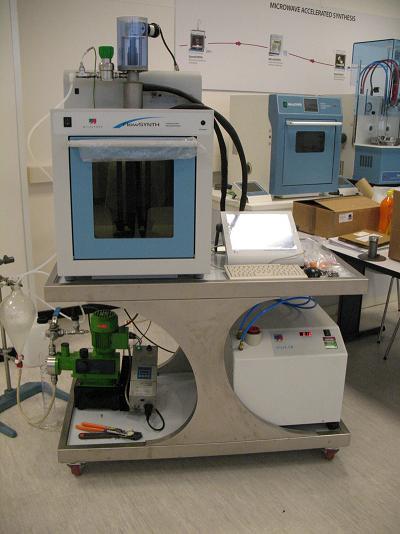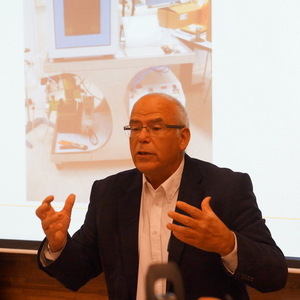Israeli-Taiwanese team developing microwave biodiesel process




Photo: National Cheng Kung University
November 5, 2013
BY Ron Kotrba
Using microwaves and strontium oxide (SrO) catalyst, Bar-llan University (Israel) chemistry professor Aharon Gedanken, also a visiting chair professor at National Cheng Kung University in Taiwan, said at a recent press conference that he’s developed a process to convert used cooking oil to biodiesel in 10 seconds. NCKU professor Jiunn-Der Liao, who said the technology is currently in the patent application process, invited Gedanken to cooperate with NCKU faculty conducting the research.
“I was told that Taiwanese people like to cook a lot and the waste cooked oils can be a problem for the environment,” Gedanken said. “So we come up with an idea that is very unique to combine the microwave and with certain catalyst that we can fully convert the waste cooked oils into the biodiesel in 10 seconds.”
Gedanken said in the EU, 20 percent of diesel will be biodiesel by 2020, “and I hope by that year in Taiwan 100 percent will go to biodiesel and, if the project is successful, we can convince people to collect waste cooked oils instead of throw it away.”
He said the university can convert 100 kilograms of used cooking oil to biodiesel per day currently. “Actually, everyone can do it on [a] small scale at [their] home kitchen with the domestic microwave,” Gedanken noted, adding that used cooking oil and SrO will yield biodiesel, SrO and glycerol. “And in between we have SrO, the catalyst, which can be removed and recycled to carry out at least 10 more times the same reaction,” he said.
Advertisement
“We believe we can convince the industry to build on a larger scale that we can convert all the cooked oils into biodiesel,” Gedanken said. “It is [our] hope this will be the replacement for fossil oil in the future.”
Advertisement
Related Stories
The USDA maintained its 2024-’25 and 2025-’26 forecasts for soybean oil use in biofuel production in its latest WASDE report, released Sept. 12. The estimate for 2023-’24 soybean oil use in biofuel production was revised up.
The USDA increased its forecast for 2025 soybean production in its latest Crop Production report, released Sept. 12. Soybean production for beans is forecast at 4.3 billion bushels, up slightly from the August forecast, but down 2% from last year.
More than 40 members of Congress on Sept. 9 sent a letter to U.S. EPA Administrator Lee Zeldin urging the agency to reduce proposed RFS RVOs for 2026 and 2027, block reallocation of SRE volumes, and scrap plans to boost domestic biofuel production.
The U.S. EIA on Aug. 29 released data showing total U.S. operable biofuels capacity expanded slightly in June, with small gains for both ethanol and renewable diesel. Feedstock consumption was up when compared to the previous month.
EcoCeres Inc., a leading pure-play renewable fuels producer, is partnering with Xiamen Airlines to collect and transport waste cooking oil from selected restaurant partners through its established supply chain.
Upcoming Events










